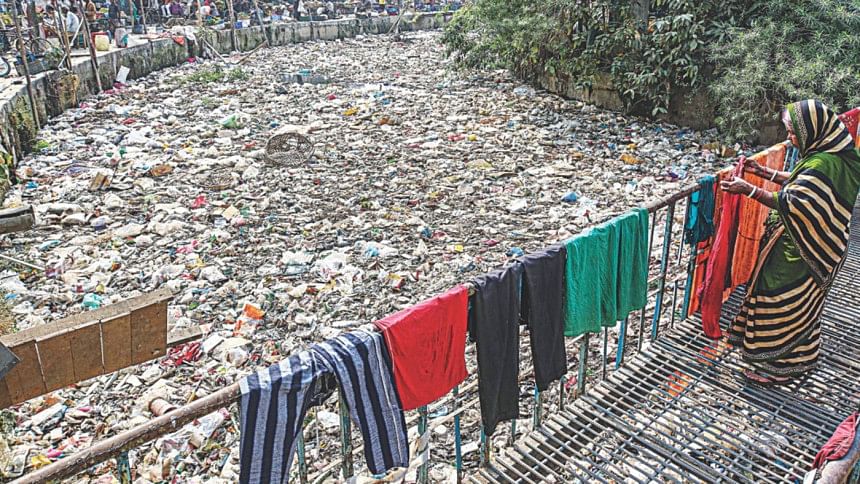Why we should restrict the use of plastic bags

Every day, plastic shopping bags in huge quantities are being thrown away by the shoppers just after single use. These bags are very thin, and having aerodynamic properties they fly in the air, get entangled in trees or find their ways in water. The bags, thus getting out of the recycling process, are posing a serious threat to our environment. They obstruct the storm water drains, clog the sewerage system and cause floods.
Plastic is a petroleum product. Both the production and recycling process of plastic consume a significant amount of non-renewable fossil fuel such as oil, gas, etc. and emit a huge quantity of carbon in the atmosphere. It is estimated that 8 percent of oil production in the world is utilised to produce plastic.
Plastics, once released in the environment, do not biodegrade. It takes 1000 years for those just to photodegrade, i.e. to break down into smaller pieces. Since they do not rot and turn into compost, they decrease the fertility of the soil resulting in less production of crops.
As many of us may know, oceans cover about 72 percent of the Earth's surface. The human-generated garbage that finds their way into the seas via rivers, canals, harbours, etc. constitutes enormous patches known as "gyres". The most famous of such patches is the Great Pacific garbage patch—a whirlpool in the Pacific that draws trash to an area as big as the size of Texas. A major portion of the trash is made up of leftover plastics. The North Pacific Gyre is one of the six gyres in the world; the others are located in the South Pacific Ocean, the North and South Atlantic, and the Indian Ocean. These gyres together represent 40 percent of the sea and plastics constitute 90 percent of their garbage.
It goes without saying that these accumulated plastics have a very harmful effect on marine life. They break into pieces after photodegradation and find their ways into the stomachs of marine animals which ingest them, mistaking them for jellyfish, a favourite food item for them. The ingestion of plastic can cause death to the sea creatures. In 2007, a whale with four hundred pounds of plastic in its stomach was found dead off the coast of California.
Likewise, a lot of dead seabirds were found with their stomachs filled with plastic materials. Researchers found almost every kind of fish examined in the central Pacific region with their guts having some fragments of plastic. The plastic obstructs, chokes, clogs or stops the passage of food of marine animals. Not only does the physical obstruction by plastic products account for their death but chemical toxicities too can contribute to their death. Around 100,000 million marine animals die each year swallowing plastic. The ocean water getting mixed with particles of plastic turns into a "global microplastic soup" or "plastic soup" that is very poisonous and intoxicates the marine animals, which in turn enters our food chain and becomes a menace to our health.
Plastic is responsible for many disorders in the human body. BPA, one of the components of plastic, causes harm to our reproductive system and gender neutrality among babies. BPA causes breast cancer, prostate cancer, early puberty, miscarriage, obesity, type 2 diabetes, ADHD and autism. Polyvinyl chloride causes rhinitis, asthma, eczema, allergies, premature birth, obesity, thyroid dysfunction, insulin resistance, etc. Researchers say that plastic releases harmful dioxin into the air, and people who work in the plastic industries run the risk of contracting cancer and other diseases. Moreover, coloured plastic bags containing chromium and copper can cause allergies in the human body.
Given the harmful effects of plastic on the environment and human health, we should urgently find a way to restrict the use of plastic shopping bags. However, in doing so, we must make sure that alternative options—such as jute bags or paper bags, which are eco-friendly—are available in the market and easily accessible for the common people. There is a misconception that plastic bags brought comfort to our life. Just look back to our grandparents' way of life. They did not use plastic shopping bags, but that did not make them less happy.
Quazi Saleh Mustanzir is Deputy Secretary, Planning Commission, Dhaka.

 For all latest news, follow The Daily Star's Google News channel.
For all latest news, follow The Daily Star's Google News channel. 



Comments